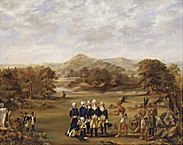| Entries |
| T |
|
Treaties
|

|
The Treaty of Greenville, Ohio (1795), ceded to the federal government the southern two-thirds of present-day Ohio, ending the allied Indians' long battle to maintain the Ohio River as the boundary between areas for white and Indian settlement, a boundary set by the Treaty of Fort Stanwix in 1768. The treaty also ceded 16 tracts at strategic locations on the water transportation routes of the Northwest Territory, including three in present-day Illinois: (1) the mouth of the Chicago River, where Fort Dearborn was erected in 1803; (2) the portage area between the Chicago and Des Plaines Rivers; and (3) the mouth of the Illinois river.
Following the War of 1812, the regional band of Ottawa, Chippewa, and Potawatomi ceded to the United States a strip of land extending directly southwest from points 10 miles north and 10 miles south of the mouth of the Chicago River. Through this Treaty of St. Louis (1816), the government acquired control over the Chicago River corridor linking Lake Michigan and the Mississippi River. At Chicago, Ottawa, Chippewa, and Potawatomi representatives signed a treaty August 29, 1821, giving up land in southwestern Michigan and also gave permission to build a road from Detroit to Chicago, completed in 1835.
The pioneer farm of Antoine Ouilmette, now a lighthouse site in Wilmette, marked the corner of an area extending westward to the Rock River ceded by the Treaty of Prairie du Chien (Wisconsin, 1829). Other treaty provisions granted sections of land along the Chicago and Des Plaines Rivers to several people of Indian heritage, including Billy Caldwell, Alexander Robinson, and Archange Ouilmette, Potawatomi wife of Antoine.
The famous Treaty of Chicago (1833) brought an estimated three thousand Indians, traders, government officials, army troops, land speculators, and adventurers to the small village to witness the dramatic proceedings whereby the Potawatomi ceded the last of their Illinois and Wisconsin lands and their last reservations in Michigan. Indians began the demanded removal to land west of the Mississippi river, or fled to Wisconsin and Canada before the treaty was ratified in 1835.
The Encyclopedia of Chicago © 2004 The Newberry Library. All Rights Reserved. Portions are copyrighted by other institutions and individuals. Additional information on copyright and permissions.